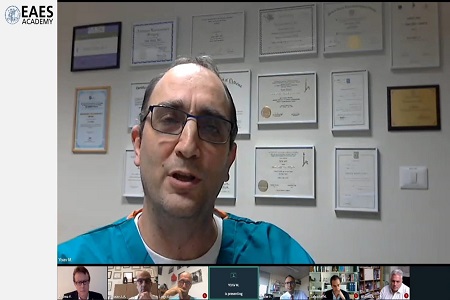
With some 500 surgeons from all over the world listening in, Hadassah Medical Organization senior surgeon Prof. Yoav Mintz shared his expertise about appropriate protocols when returning to the operating room to perform elective procedures in the midst of COVID-19. Prof. Mintz was one of three physicians on this international panel hosted by the European Association for Endoscopic Surgery. The other panelists were from Miami, Florida, and Milan, Italy.
At hospitals in which there is now less pressure on resources due to a decrease in COVID-19 patients, surgeons are returning to elective procedures. The panelists addressed the protocols that would ensure safe surgery for both patients and their medical teams. Prof. Mintz’ presentation focused on how surgeons can stay safe.
As he explained, “When we’re dealing with emergencies, we have no time to verify if a patient is positive for the coronavirus. We have to assume the patient may be positive.” Prof. Mintz added, “There are reports that bodily fluids carry the virus, or a part of it, but there’s no hard evidence. That, of course, doesn’t mean it doesn’t exist, so at this stage we have to exercise extreme caution.”
Operating on patients from COVID outbreak units, Prof. Mintz noted, requires that precautions begin when transferring them to the operating room. Transporters in full protective gear must move the patients from the outbreak units through dedicated corridors directly to coronavirus-dedicated operating rooms. Intubation needs to be done with particular care. Protective gear may have to be modified so the surgeon’s vision is not compromised. “Surgeons need full visual acuity while they are protected,” Prof. Mintz emphasized.
Until patients can return directly to their outbreak unit, Prof. Mintz said, they should remain in the operating room. Cleaning staff, he cautions, will need a full hour to decontaminate the room, so surgeries need to be spaced accordingly.
A specialist in laparoscopic surgery, Prof. Mintz believes that less invasive procedures, such as laparoscopies, should be reintroduced first because of their overall lower risks as compared to open surgery, including reduced risk of wound infection and shorter hospital stays, as well as less postsurgical pain and more rapid return to normal activities. In addition, should the coronavirus be present, Prof. Mintz noted that the use of an inexpensive filter allows for a greater ability to control the virus’s transmission through the surgical smoke during a laparoscopy. Surgical smoke is a by-product of removing or vaporizing tissue.
Prof. Mintz commented that with these protocols in place, as they are at Hadassah, surgeons can return to the operating room to perform elective procedures.
